Leadership and Management Strategies: Rosewood Hotel Analysis
VerifiedAdded on 2022/11/30
|11
|3634
|335
Report
AI Summary
This report analyzes leadership and management practices at Rosewood Hotel in London. It begins with an introduction to leadership and management, followed by an examination of classical management theories, including bureaucracy and scientific management. The report then explores the roles of leaders, various leadership styles (autocratic, democratic, and laissez-faire), and the application of management and leadership styles within Rosewood Hotel, such as authoritative, persuasive, consultative, and collaborative approaches. A SWOT analysis identifies internal strengths and weaknesses, while a PESTEL analysis examines external political, economic, social, and technological factors affecting the hotel. The report also discusses the hard and soft skills required for effective management and leadership in the service sector and concludes with the future management and leadership skills that Rosewood Hotel will need. This report provides a comprehensive overview of the leadership and management strategies used by Rosewood Hotel, offering valuable insights into the challenges and opportunities within the hospitality industry.
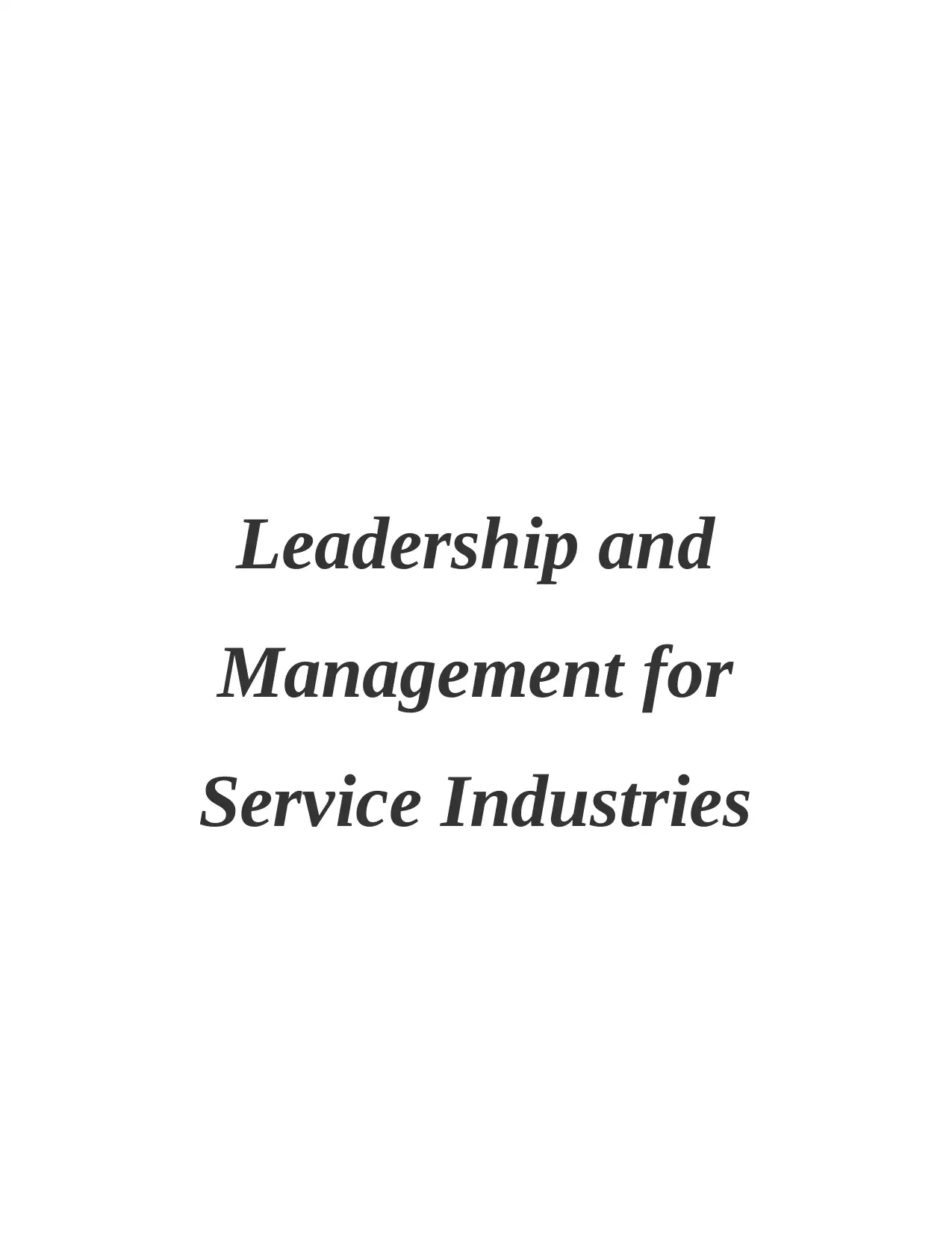
Leadership and
Management for
Service Industries
Management for
Service Industries
Paraphrase This Document
Need a fresh take? Get an instant paraphrase of this document with our AI Paraphraser
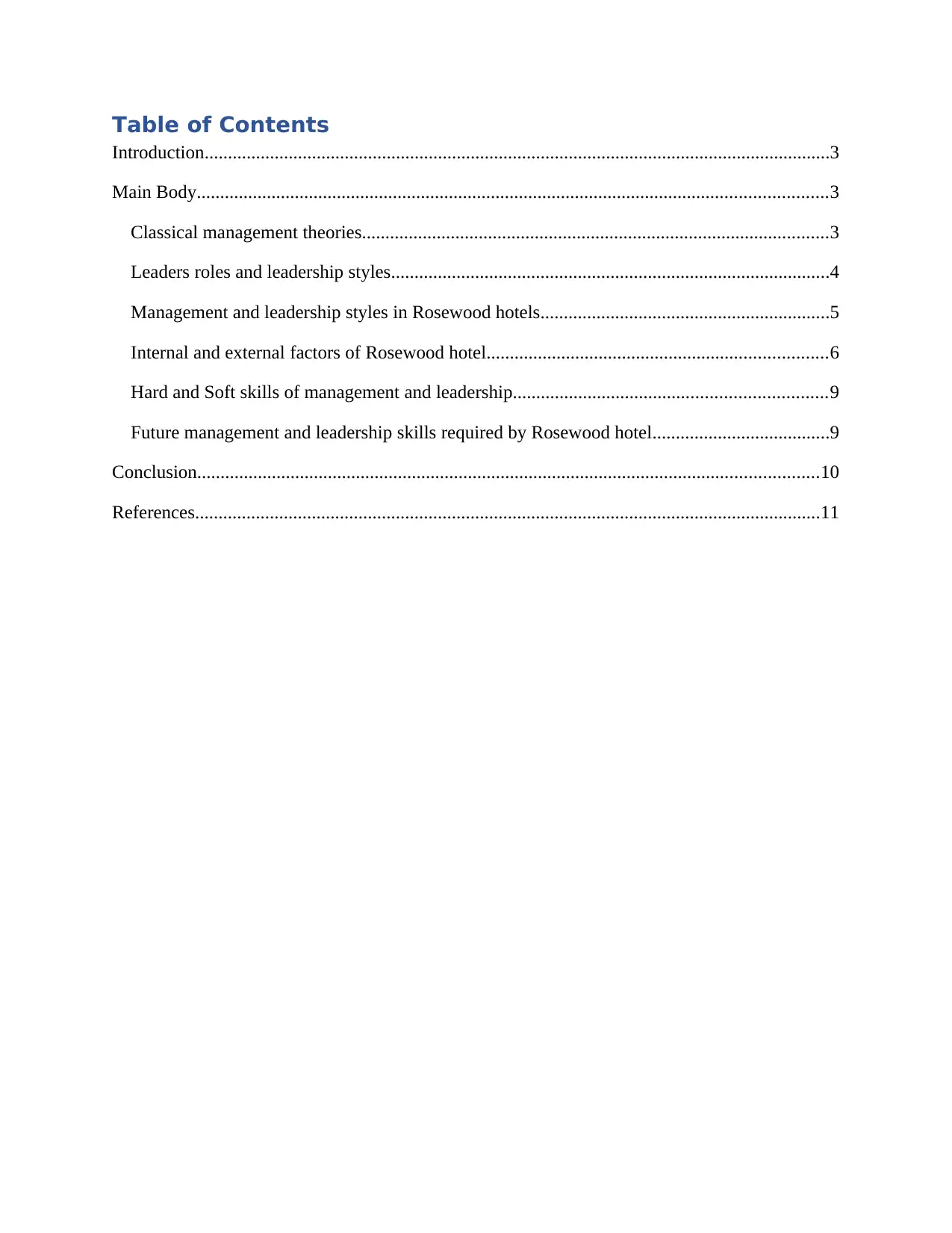
Table of Contents
Introduction......................................................................................................................................3
Main Body.......................................................................................................................................3
Classical management theories....................................................................................................3
Leaders roles and leadership styles..............................................................................................4
Management and leadership styles in Rosewood hotels..............................................................5
Internal and external factors of Rosewood hotel.........................................................................6
Hard and Soft skills of management and leadership...................................................................9
Future management and leadership skills required by Rosewood hotel......................................9
Conclusion.....................................................................................................................................10
References......................................................................................................................................11
Introduction......................................................................................................................................3
Main Body.......................................................................................................................................3
Classical management theories....................................................................................................3
Leaders roles and leadership styles..............................................................................................4
Management and leadership styles in Rosewood hotels..............................................................5
Internal and external factors of Rosewood hotel.........................................................................6
Hard and Soft skills of management and leadership...................................................................9
Future management and leadership skills required by Rosewood hotel......................................9
Conclusion.....................................................................................................................................10
References......................................................................................................................................11
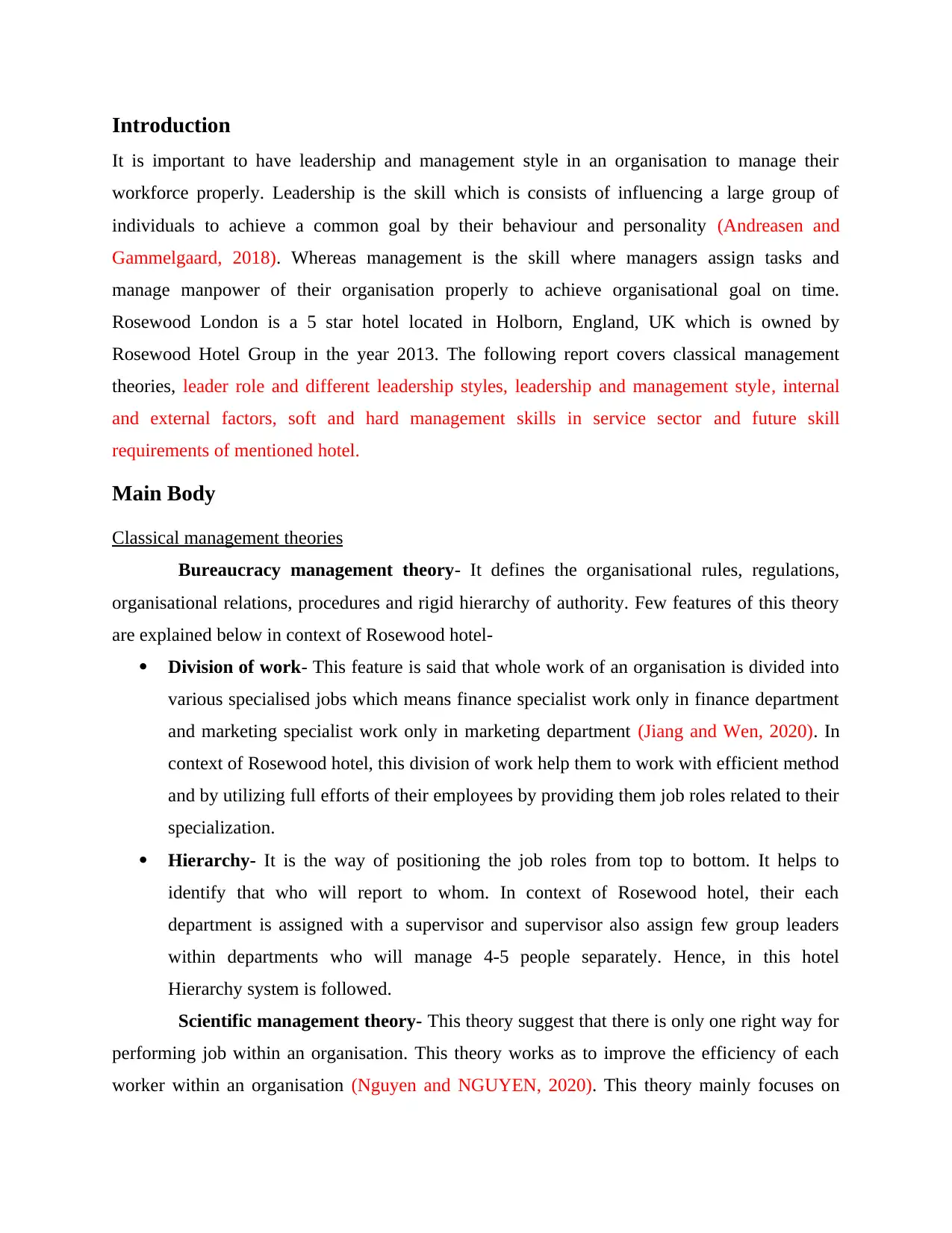
Introduction
It is important to have leadership and management style in an organisation to manage their
workforce properly. Leadership is the skill which is consists of influencing a large group of
individuals to achieve a common goal by their behaviour and personality (Andreasen and
Gammelgaard, 2018). Whereas management is the skill where managers assign tasks and
manage manpower of their organisation properly to achieve organisational goal on time.
Rosewood London is a 5 star hotel located in Holborn, England, UK which is owned by
Rosewood Hotel Group in the year 2013. The following report covers classical management
theories, leader role and different leadership styles, leadership and management style, internal
and external factors, soft and hard management skills in service sector and future skill
requirements of mentioned hotel.
Main Body
Classical management theories
Bureaucracy management theory- It defines the organisational rules, regulations,
organisational relations, procedures and rigid hierarchy of authority. Few features of this theory
are explained below in context of Rosewood hotel-
Division of work- This feature is said that whole work of an organisation is divided into
various specialised jobs which means finance specialist work only in finance department
and marketing specialist work only in marketing department (Jiang and Wen, 2020). In
context of Rosewood hotel, this division of work help them to work with efficient method
and by utilizing full efforts of their employees by providing them job roles related to their
specialization.
Hierarchy- It is the way of positioning the job roles from top to bottom. It helps to
identify that who will report to whom. In context of Rosewood hotel, their each
department is assigned with a supervisor and supervisor also assign few group leaders
within departments who will manage 4-5 people separately. Hence, in this hotel
Hierarchy system is followed.
Scientific management theory- This theory suggest that there is only one right way for
performing job within an organisation. This theory works as to improve the efficiency of each
worker within an organisation (Nguyen and NGUYEN, 2020). This theory mainly focuses on
It is important to have leadership and management style in an organisation to manage their
workforce properly. Leadership is the skill which is consists of influencing a large group of
individuals to achieve a common goal by their behaviour and personality (Andreasen and
Gammelgaard, 2018). Whereas management is the skill where managers assign tasks and
manage manpower of their organisation properly to achieve organisational goal on time.
Rosewood London is a 5 star hotel located in Holborn, England, UK which is owned by
Rosewood Hotel Group in the year 2013. The following report covers classical management
theories, leader role and different leadership styles, leadership and management style, internal
and external factors, soft and hard management skills in service sector and future skill
requirements of mentioned hotel.
Main Body
Classical management theories
Bureaucracy management theory- It defines the organisational rules, regulations,
organisational relations, procedures and rigid hierarchy of authority. Few features of this theory
are explained below in context of Rosewood hotel-
Division of work- This feature is said that whole work of an organisation is divided into
various specialised jobs which means finance specialist work only in finance department
and marketing specialist work only in marketing department (Jiang and Wen, 2020). In
context of Rosewood hotel, this division of work help them to work with efficient method
and by utilizing full efforts of their employees by providing them job roles related to their
specialization.
Hierarchy- It is the way of positioning the job roles from top to bottom. It helps to
identify that who will report to whom. In context of Rosewood hotel, their each
department is assigned with a supervisor and supervisor also assign few group leaders
within departments who will manage 4-5 people separately. Hence, in this hotel
Hierarchy system is followed.
Scientific management theory- This theory suggest that there is only one right way for
performing job within an organisation. This theory works as to improve the efficiency of each
worker within an organisation (Nguyen and NGUYEN, 2020). This theory mainly focuses on
⊘ This is a preview!⊘
Do you want full access?
Subscribe today to unlock all pages.

Trusted by 1+ million students worldwide
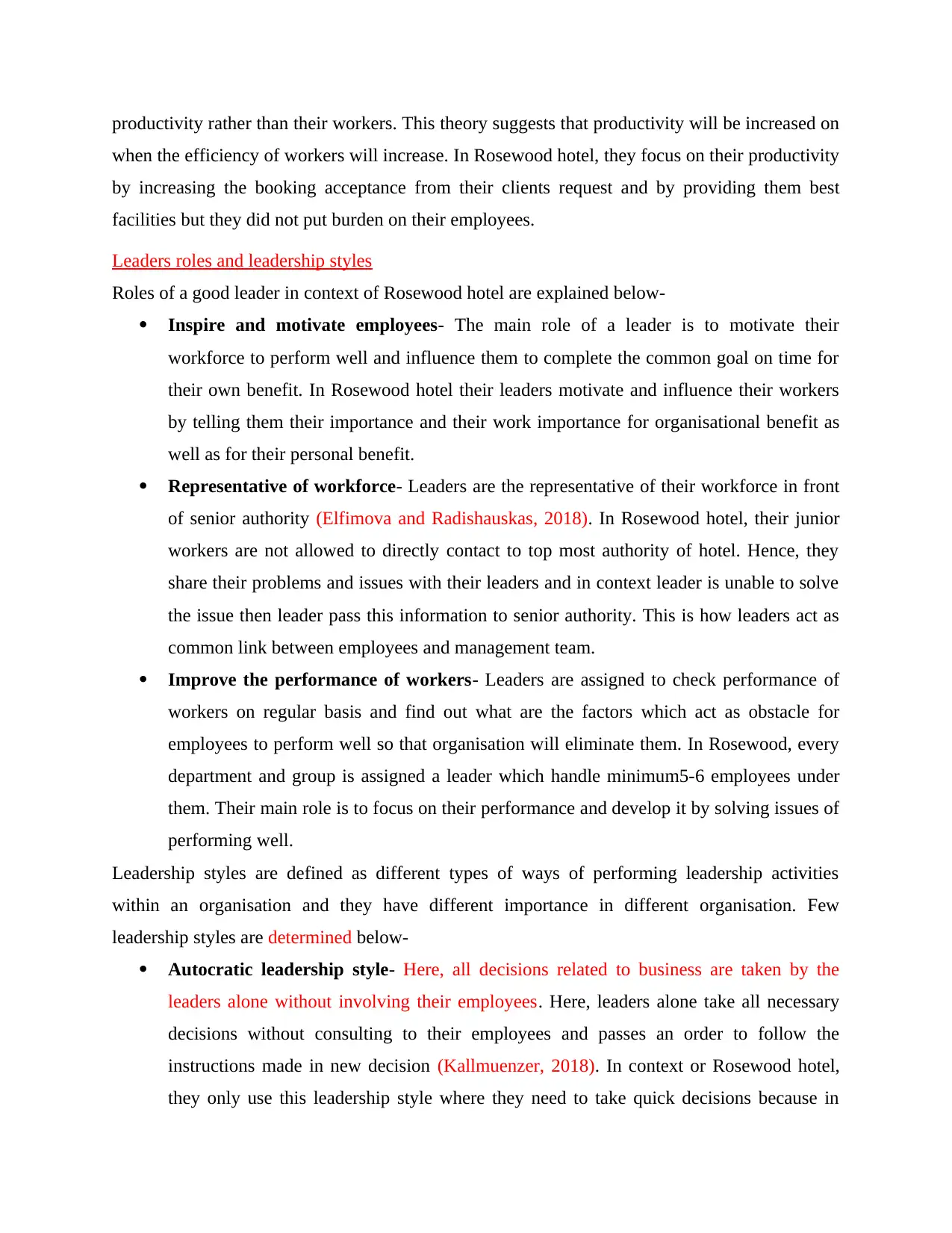
productivity rather than their workers. This theory suggests that productivity will be increased on
when the efficiency of workers will increase. In Rosewood hotel, they focus on their productivity
by increasing the booking acceptance from their clients request and by providing them best
facilities but they did not put burden on their employees.
Leaders roles and leadership styles
Roles of a good leader in context of Rosewood hotel are explained below-
Inspire and motivate employees- The main role of a leader is to motivate their
workforce to perform well and influence them to complete the common goal on time for
their own benefit. In Rosewood hotel their leaders motivate and influence their workers
by telling them their importance and their work importance for organisational benefit as
well as for their personal benefit.
Representative of workforce- Leaders are the representative of their workforce in front
of senior authority (Elfimova and Radishauskas, 2018). In Rosewood hotel, their junior
workers are not allowed to directly contact to top most authority of hotel. Hence, they
share their problems and issues with their leaders and in context leader is unable to solve
the issue then leader pass this information to senior authority. This is how leaders act as
common link between employees and management team.
Improve the performance of workers- Leaders are assigned to check performance of
workers on regular basis and find out what are the factors which act as obstacle for
employees to perform well so that organisation will eliminate them. In Rosewood, every
department and group is assigned a leader which handle minimum5-6 employees under
them. Their main role is to focus on their performance and develop it by solving issues of
performing well.
Leadership styles are defined as different types of ways of performing leadership activities
within an organisation and they have different importance in different organisation. Few
leadership styles are determined below-
Autocratic leadership style- Here, all decisions related to business are taken by the
leaders alone without involving their employees. Here, leaders alone take all necessary
decisions without consulting to their employees and passes an order to follow the
instructions made in new decision (Kallmuenzer, 2018). In context or Rosewood hotel,
they only use this leadership style where they need to take quick decisions because in
when the efficiency of workers will increase. In Rosewood hotel, they focus on their productivity
by increasing the booking acceptance from their clients request and by providing them best
facilities but they did not put burden on their employees.
Leaders roles and leadership styles
Roles of a good leader in context of Rosewood hotel are explained below-
Inspire and motivate employees- The main role of a leader is to motivate their
workforce to perform well and influence them to complete the common goal on time for
their own benefit. In Rosewood hotel their leaders motivate and influence their workers
by telling them their importance and their work importance for organisational benefit as
well as for their personal benefit.
Representative of workforce- Leaders are the representative of their workforce in front
of senior authority (Elfimova and Radishauskas, 2018). In Rosewood hotel, their junior
workers are not allowed to directly contact to top most authority of hotel. Hence, they
share their problems and issues with their leaders and in context leader is unable to solve
the issue then leader pass this information to senior authority. This is how leaders act as
common link between employees and management team.
Improve the performance of workers- Leaders are assigned to check performance of
workers on regular basis and find out what are the factors which act as obstacle for
employees to perform well so that organisation will eliminate them. In Rosewood, every
department and group is assigned a leader which handle minimum5-6 employees under
them. Their main role is to focus on their performance and develop it by solving issues of
performing well.
Leadership styles are defined as different types of ways of performing leadership activities
within an organisation and they have different importance in different organisation. Few
leadership styles are determined below-
Autocratic leadership style- Here, all decisions related to business are taken by the
leaders alone without involving their employees. Here, leaders alone take all necessary
decisions without consulting to their employees and passes an order to follow the
instructions made in new decision (Kallmuenzer, 2018). In context or Rosewood hotel,
they only use this leadership style where they need to take quick decisions because in
Paraphrase This Document
Need a fresh take? Get an instant paraphrase of this document with our AI Paraphraser
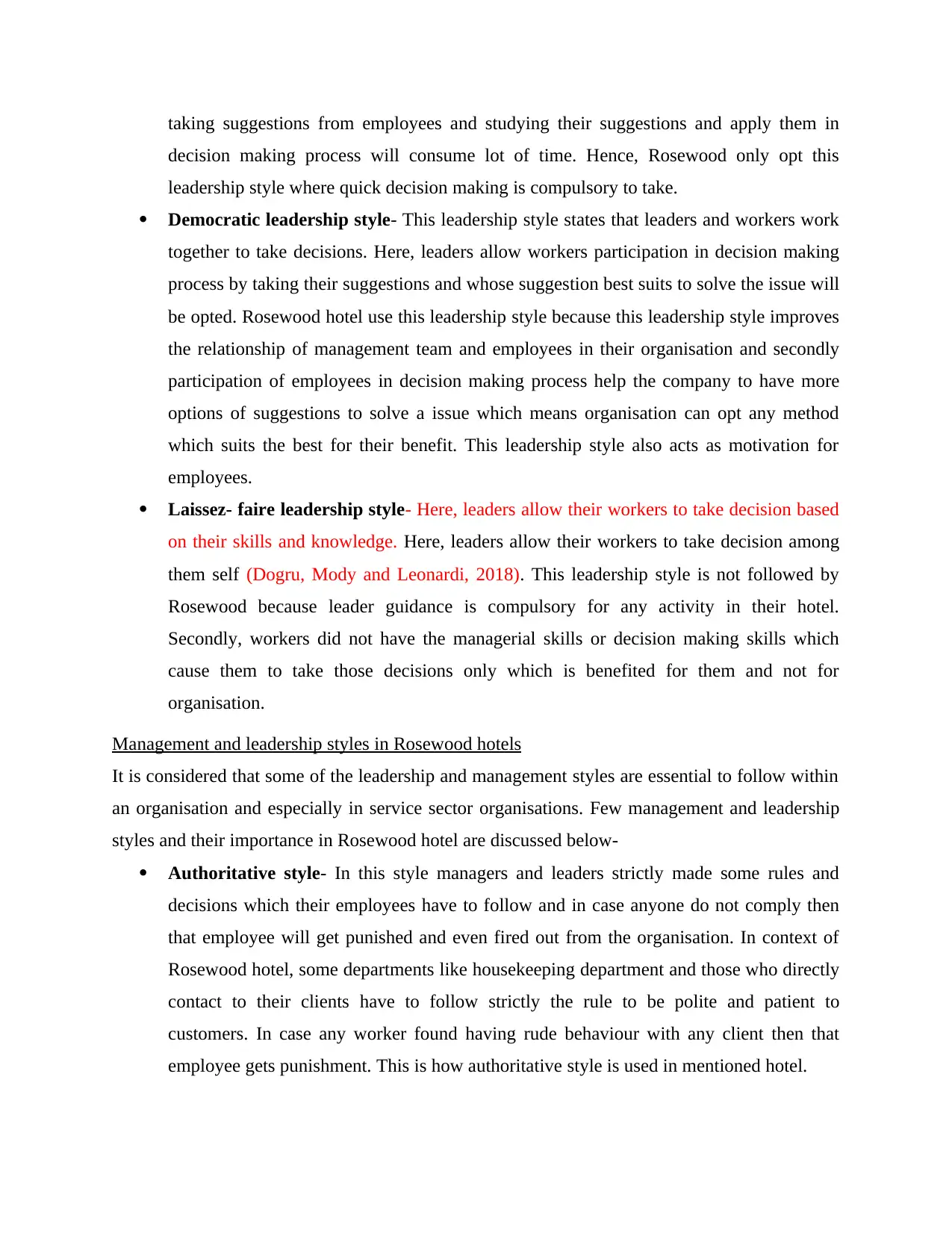
taking suggestions from employees and studying their suggestions and apply them in
decision making process will consume lot of time. Hence, Rosewood only opt this
leadership style where quick decision making is compulsory to take.
Democratic leadership style- This leadership style states that leaders and workers work
together to take decisions. Here, leaders allow workers participation in decision making
process by taking their suggestions and whose suggestion best suits to solve the issue will
be opted. Rosewood hotel use this leadership style because this leadership style improves
the relationship of management team and employees in their organisation and secondly
participation of employees in decision making process help the company to have more
options of suggestions to solve a issue which means organisation can opt any method
which suits the best for their benefit. This leadership style also acts as motivation for
employees.
Laissez- faire leadership style- Here, leaders allow their workers to take decision based
on their skills and knowledge. Here, leaders allow their workers to take decision among
them self (Dogru, Mody and Leonardi, 2018). This leadership style is not followed by
Rosewood because leader guidance is compulsory for any activity in their hotel.
Secondly, workers did not have the managerial skills or decision making skills which
cause them to take those decisions only which is benefited for them and not for
organisation.
Management and leadership styles in Rosewood hotels
It is considered that some of the leadership and management styles are essential to follow within
an organisation and especially in service sector organisations. Few management and leadership
styles and their importance in Rosewood hotel are discussed below-
Authoritative style- In this style managers and leaders strictly made some rules and
decisions which their employees have to follow and in case anyone do not comply then
that employee will get punished and even fired out from the organisation. In context of
Rosewood hotel, some departments like housekeeping department and those who directly
contact to their clients have to follow strictly the rule to be polite and patient to
customers. In case any worker found having rude behaviour with any client then that
employee gets punishment. This is how authoritative style is used in mentioned hotel.
decision making process will consume lot of time. Hence, Rosewood only opt this
leadership style where quick decision making is compulsory to take.
Democratic leadership style- This leadership style states that leaders and workers work
together to take decisions. Here, leaders allow workers participation in decision making
process by taking their suggestions and whose suggestion best suits to solve the issue will
be opted. Rosewood hotel use this leadership style because this leadership style improves
the relationship of management team and employees in their organisation and secondly
participation of employees in decision making process help the company to have more
options of suggestions to solve a issue which means organisation can opt any method
which suits the best for their benefit. This leadership style also acts as motivation for
employees.
Laissez- faire leadership style- Here, leaders allow their workers to take decision based
on their skills and knowledge. Here, leaders allow their workers to take decision among
them self (Dogru, Mody and Leonardi, 2018). This leadership style is not followed by
Rosewood because leader guidance is compulsory for any activity in their hotel.
Secondly, workers did not have the managerial skills or decision making skills which
cause them to take those decisions only which is benefited for them and not for
organisation.
Management and leadership styles in Rosewood hotels
It is considered that some of the leadership and management styles are essential to follow within
an organisation and especially in service sector organisations. Few management and leadership
styles and their importance in Rosewood hotel are discussed below-
Authoritative style- In this style managers and leaders strictly made some rules and
decisions which their employees have to follow and in case anyone do not comply then
that employee will get punished and even fired out from the organisation. In context of
Rosewood hotel, some departments like housekeeping department and those who directly
contact to their clients have to follow strictly the rule to be polite and patient to
customers. In case any worker found having rude behaviour with any client then that
employee gets punishment. This is how authoritative style is used in mentioned hotel.
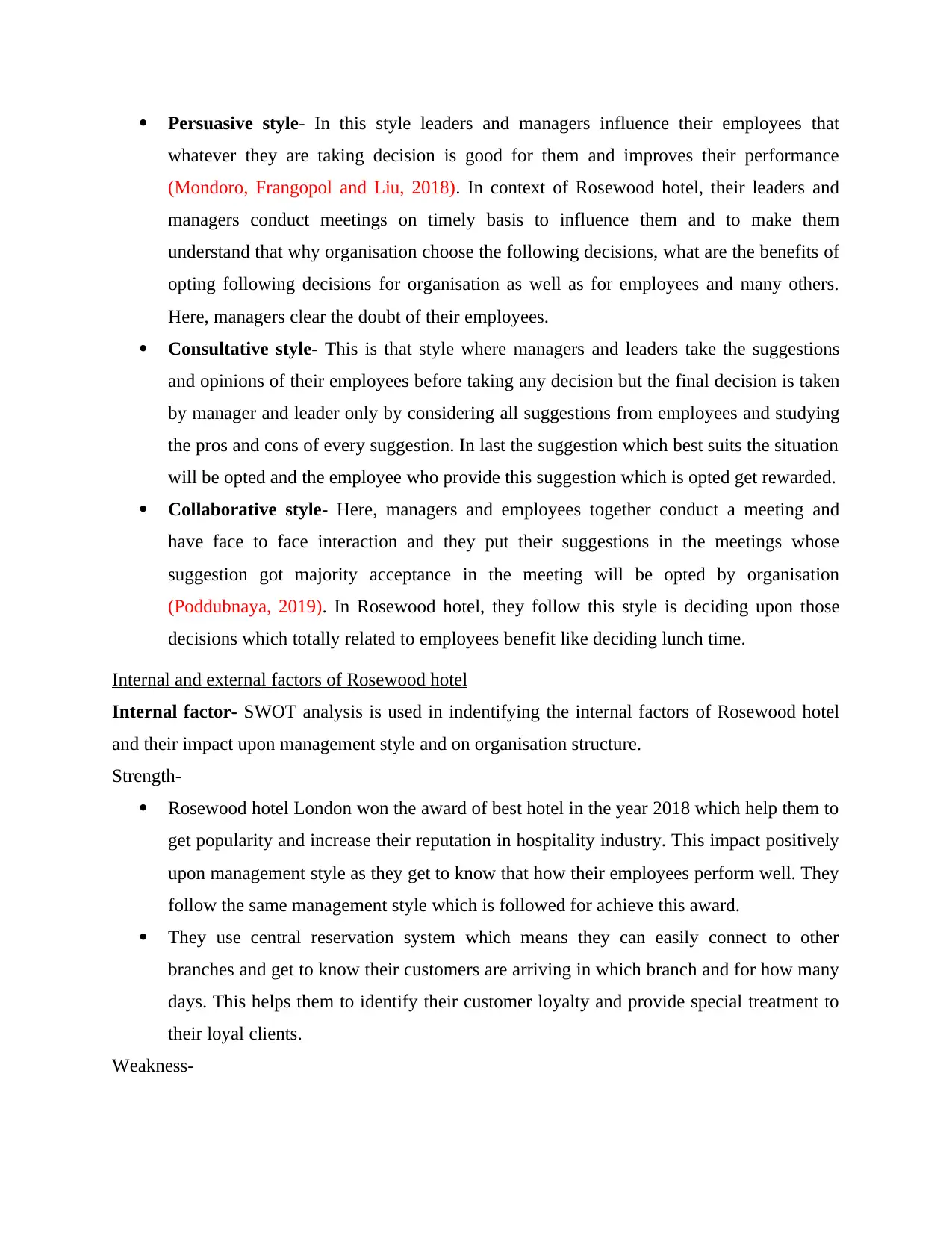
Persuasive style- In this style leaders and managers influence their employees that
whatever they are taking decision is good for them and improves their performance
(Mondoro, Frangopol and Liu, 2018). In context of Rosewood hotel, their leaders and
managers conduct meetings on timely basis to influence them and to make them
understand that why organisation choose the following decisions, what are the benefits of
opting following decisions for organisation as well as for employees and many others.
Here, managers clear the doubt of their employees.
Consultative style- This is that style where managers and leaders take the suggestions
and opinions of their employees before taking any decision but the final decision is taken
by manager and leader only by considering all suggestions from employees and studying
the pros and cons of every suggestion. In last the suggestion which best suits the situation
will be opted and the employee who provide this suggestion which is opted get rewarded.
Collaborative style- Here, managers and employees together conduct a meeting and
have face to face interaction and they put their suggestions in the meetings whose
suggestion got majority acceptance in the meeting will be opted by organisation
(Poddubnaya, 2019). In Rosewood hotel, they follow this style is deciding upon those
decisions which totally related to employees benefit like deciding lunch time.
Internal and external factors of Rosewood hotel
Internal factor- SWOT analysis is used in indentifying the internal factors of Rosewood hotel
and their impact upon management style and on organisation structure.
Strength-
Rosewood hotel London won the award of best hotel in the year 2018 which help them to
get popularity and increase their reputation in hospitality industry. This impact positively
upon management style as they get to know that how their employees perform well. They
follow the same management style which is followed for achieve this award.
They use central reservation system which means they can easily connect to other
branches and get to know their customers are arriving in which branch and for how many
days. This helps them to identify their customer loyalty and provide special treatment to
their loyal clients.
Weakness-
whatever they are taking decision is good for them and improves their performance
(Mondoro, Frangopol and Liu, 2018). In context of Rosewood hotel, their leaders and
managers conduct meetings on timely basis to influence them and to make them
understand that why organisation choose the following decisions, what are the benefits of
opting following decisions for organisation as well as for employees and many others.
Here, managers clear the doubt of their employees.
Consultative style- This is that style where managers and leaders take the suggestions
and opinions of their employees before taking any decision but the final decision is taken
by manager and leader only by considering all suggestions from employees and studying
the pros and cons of every suggestion. In last the suggestion which best suits the situation
will be opted and the employee who provide this suggestion which is opted get rewarded.
Collaborative style- Here, managers and employees together conduct a meeting and
have face to face interaction and they put their suggestions in the meetings whose
suggestion got majority acceptance in the meeting will be opted by organisation
(Poddubnaya, 2019). In Rosewood hotel, they follow this style is deciding upon those
decisions which totally related to employees benefit like deciding lunch time.
Internal and external factors of Rosewood hotel
Internal factor- SWOT analysis is used in indentifying the internal factors of Rosewood hotel
and their impact upon management style and on organisation structure.
Strength-
Rosewood hotel London won the award of best hotel in the year 2018 which help them to
get popularity and increase their reputation in hospitality industry. This impact positively
upon management style as they get to know that how their employees perform well. They
follow the same management style which is followed for achieve this award.
They use central reservation system which means they can easily connect to other
branches and get to know their customers are arriving in which branch and for how many
days. This helps them to identify their customer loyalty and provide special treatment to
their loyal clients.
Weakness-
⊘ This is a preview!⊘
Do you want full access?
Subscribe today to unlock all pages.

Trusted by 1+ million students worldwide
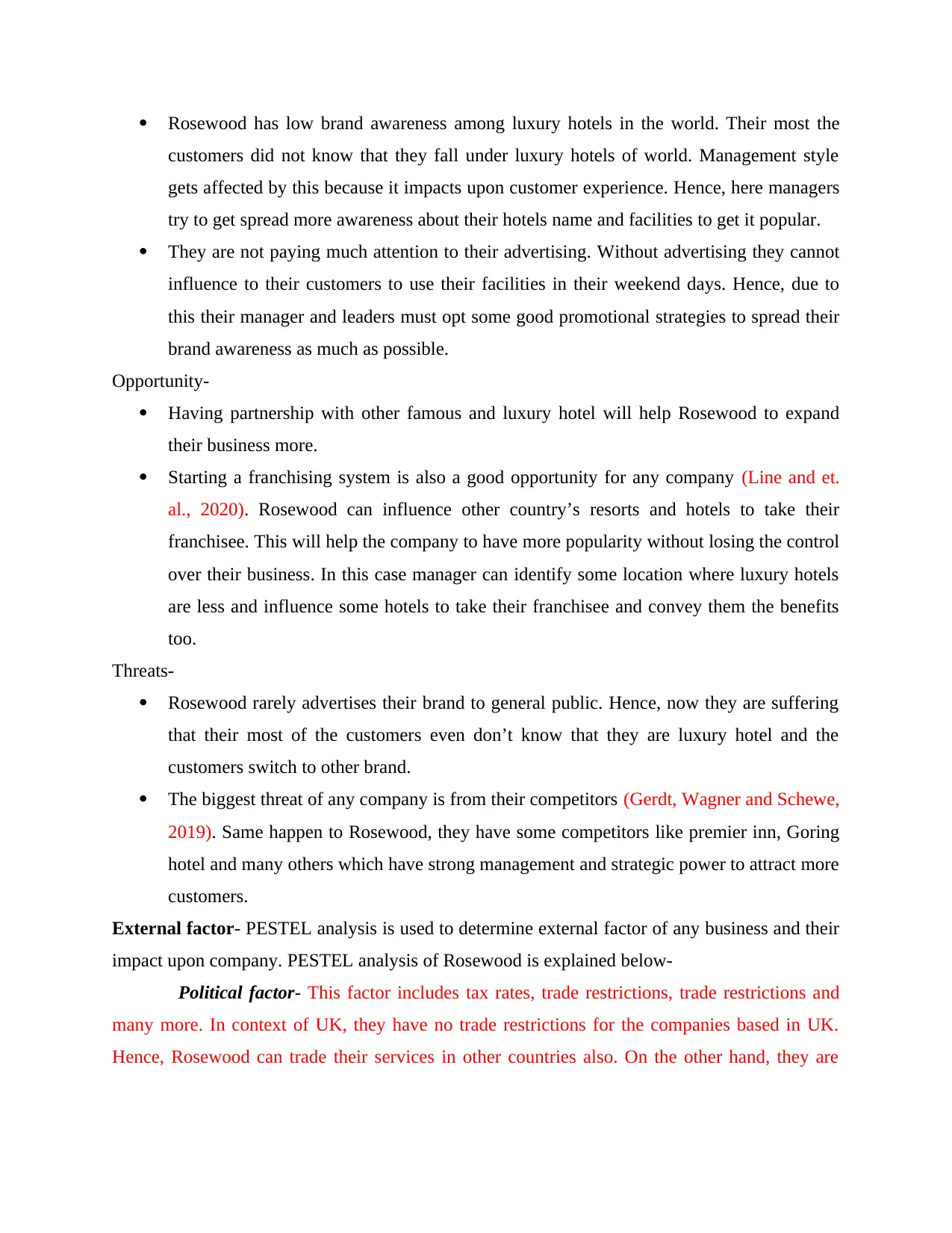
Rosewood has low brand awareness among luxury hotels in the world. Their most the
customers did not know that they fall under luxury hotels of world. Management style
gets affected by this because it impacts upon customer experience. Hence, here managers
try to get spread more awareness about their hotels name and facilities to get it popular.
They are not paying much attention to their advertising. Without advertising they cannot
influence to their customers to use their facilities in their weekend days. Hence, due to
this their manager and leaders must opt some good promotional strategies to spread their
brand awareness as much as possible.
Opportunity-
Having partnership with other famous and luxury hotel will help Rosewood to expand
their business more.
Starting a franchising system is also a good opportunity for any company (Line and et.
al., 2020). Rosewood can influence other country’s resorts and hotels to take their
franchisee. This will help the company to have more popularity without losing the control
over their business. In this case manager can identify some location where luxury hotels
are less and influence some hotels to take their franchisee and convey them the benefits
too.
Threats-
Rosewood rarely advertises their brand to general public. Hence, now they are suffering
that their most of the customers even don’t know that they are luxury hotel and the
customers switch to other brand.
The biggest threat of any company is from their competitors (Gerdt, Wagner and Schewe,
2019). Same happen to Rosewood, they have some competitors like premier inn, Goring
hotel and many others which have strong management and strategic power to attract more
customers.
External factor- PESTEL analysis is used to determine external factor of any business and their
impact upon company. PESTEL analysis of Rosewood is explained below-
Political factor- This factor includes tax rates, trade restrictions, trade restrictions and
many more. In context of UK, they have no trade restrictions for the companies based in UK.
Hence, Rosewood can trade their services in other countries also. On the other hand, they are
customers did not know that they fall under luxury hotels of world. Management style
gets affected by this because it impacts upon customer experience. Hence, here managers
try to get spread more awareness about their hotels name and facilities to get it popular.
They are not paying much attention to their advertising. Without advertising they cannot
influence to their customers to use their facilities in their weekend days. Hence, due to
this their manager and leaders must opt some good promotional strategies to spread their
brand awareness as much as possible.
Opportunity-
Having partnership with other famous and luxury hotel will help Rosewood to expand
their business more.
Starting a franchising system is also a good opportunity for any company (Line and et.
al., 2020). Rosewood can influence other country’s resorts and hotels to take their
franchisee. This will help the company to have more popularity without losing the control
over their business. In this case manager can identify some location where luxury hotels
are less and influence some hotels to take their franchisee and convey them the benefits
too.
Threats-
Rosewood rarely advertises their brand to general public. Hence, now they are suffering
that their most of the customers even don’t know that they are luxury hotel and the
customers switch to other brand.
The biggest threat of any company is from their competitors (Gerdt, Wagner and Schewe,
2019). Same happen to Rosewood, they have some competitors like premier inn, Goring
hotel and many others which have strong management and strategic power to attract more
customers.
External factor- PESTEL analysis is used to determine external factor of any business and their
impact upon company. PESTEL analysis of Rosewood is explained below-
Political factor- This factor includes tax rates, trade restrictions, trade restrictions and
many more. In context of UK, they have no trade restrictions for the companies based in UK.
Hence, Rosewood can trade their services in other countries also. On the other hand, they are
Paraphrase This Document
Need a fresh take? Get an instant paraphrase of this document with our AI Paraphraser
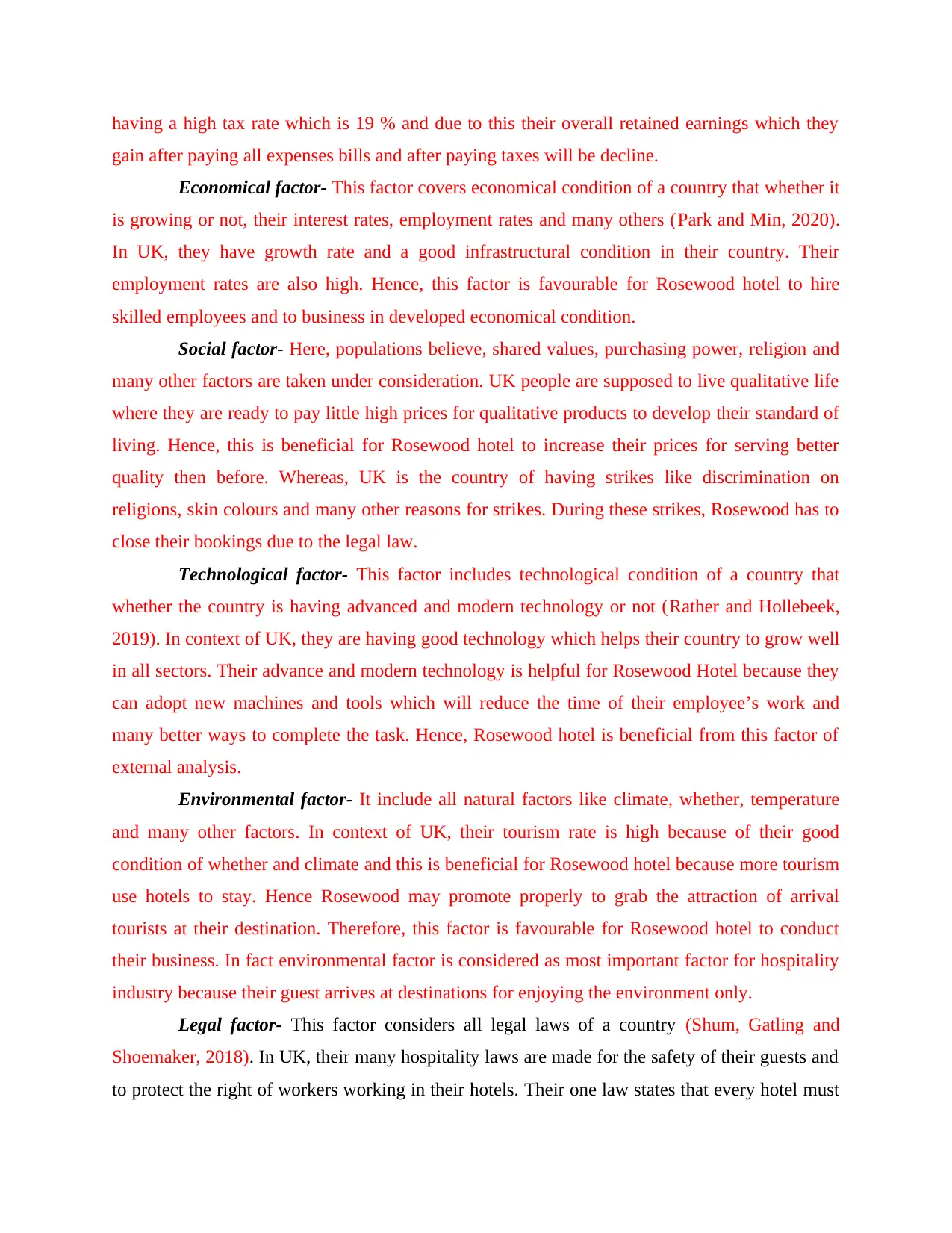
having a high tax rate which is 19 % and due to this their overall retained earnings which they
gain after paying all expenses bills and after paying taxes will be decline.
Economical factor- This factor covers economical condition of a country that whether it
is growing or not, their interest rates, employment rates and many others (Park and Min, 2020).
In UK, they have growth rate and a good infrastructural condition in their country. Their
employment rates are also high. Hence, this factor is favourable for Rosewood hotel to hire
skilled employees and to business in developed economical condition.
Social factor- Here, populations believe, shared values, purchasing power, religion and
many other factors are taken under consideration. UK people are supposed to live qualitative life
where they are ready to pay little high prices for qualitative products to develop their standard of
living. Hence, this is beneficial for Rosewood hotel to increase their prices for serving better
quality then before. Whereas, UK is the country of having strikes like discrimination on
religions, skin colours and many other reasons for strikes. During these strikes, Rosewood has to
close their bookings due to the legal law.
Technological factor- This factor includes technological condition of a country that
whether the country is having advanced and modern technology or not (Rather and Hollebeek,
2019). In context of UK, they are having good technology which helps their country to grow well
in all sectors. Their advance and modern technology is helpful for Rosewood Hotel because they
can adopt new machines and tools which will reduce the time of their employee’s work and
many better ways to complete the task. Hence, Rosewood hotel is beneficial from this factor of
external analysis.
Environmental factor- It include all natural factors like climate, whether, temperature
and many other factors. In context of UK, their tourism rate is high because of their good
condition of whether and climate and this is beneficial for Rosewood hotel because more tourism
use hotels to stay. Hence Rosewood may promote properly to grab the attraction of arrival
tourists at their destination. Therefore, this factor is favourable for Rosewood hotel to conduct
their business. In fact environmental factor is considered as most important factor for hospitality
industry because their guest arrives at destinations for enjoying the environment only.
Legal factor- This factor considers all legal laws of a country (Shum, Gatling and
Shoemaker, 2018). In UK, their many hospitality laws are made for the safety of their guests and
to protect the right of workers working in their hotels. Their one law states that every hotel must
gain after paying all expenses bills and after paying taxes will be decline.
Economical factor- This factor covers economical condition of a country that whether it
is growing or not, their interest rates, employment rates and many others (Park and Min, 2020).
In UK, they have growth rate and a good infrastructural condition in their country. Their
employment rates are also high. Hence, this factor is favourable for Rosewood hotel to hire
skilled employees and to business in developed economical condition.
Social factor- Here, populations believe, shared values, purchasing power, religion and
many other factors are taken under consideration. UK people are supposed to live qualitative life
where they are ready to pay little high prices for qualitative products to develop their standard of
living. Hence, this is beneficial for Rosewood hotel to increase their prices for serving better
quality then before. Whereas, UK is the country of having strikes like discrimination on
religions, skin colours and many other reasons for strikes. During these strikes, Rosewood has to
close their bookings due to the legal law.
Technological factor- This factor includes technological condition of a country that
whether the country is having advanced and modern technology or not (Rather and Hollebeek,
2019). In context of UK, they are having good technology which helps their country to grow well
in all sectors. Their advance and modern technology is helpful for Rosewood Hotel because they
can adopt new machines and tools which will reduce the time of their employee’s work and
many better ways to complete the task. Hence, Rosewood hotel is beneficial from this factor of
external analysis.
Environmental factor- It include all natural factors like climate, whether, temperature
and many other factors. In context of UK, their tourism rate is high because of their good
condition of whether and climate and this is beneficial for Rosewood hotel because more tourism
use hotels to stay. Hence Rosewood may promote properly to grab the attraction of arrival
tourists at their destination. Therefore, this factor is favourable for Rosewood hotel to conduct
their business. In fact environmental factor is considered as most important factor for hospitality
industry because their guest arrives at destinations for enjoying the environment only.
Legal factor- This factor considers all legal laws of a country (Shum, Gatling and
Shoemaker, 2018). In UK, their many hospitality laws are made for the safety of their guests and
to protect the right of workers working in their hotels. Their one law states that every hotel must
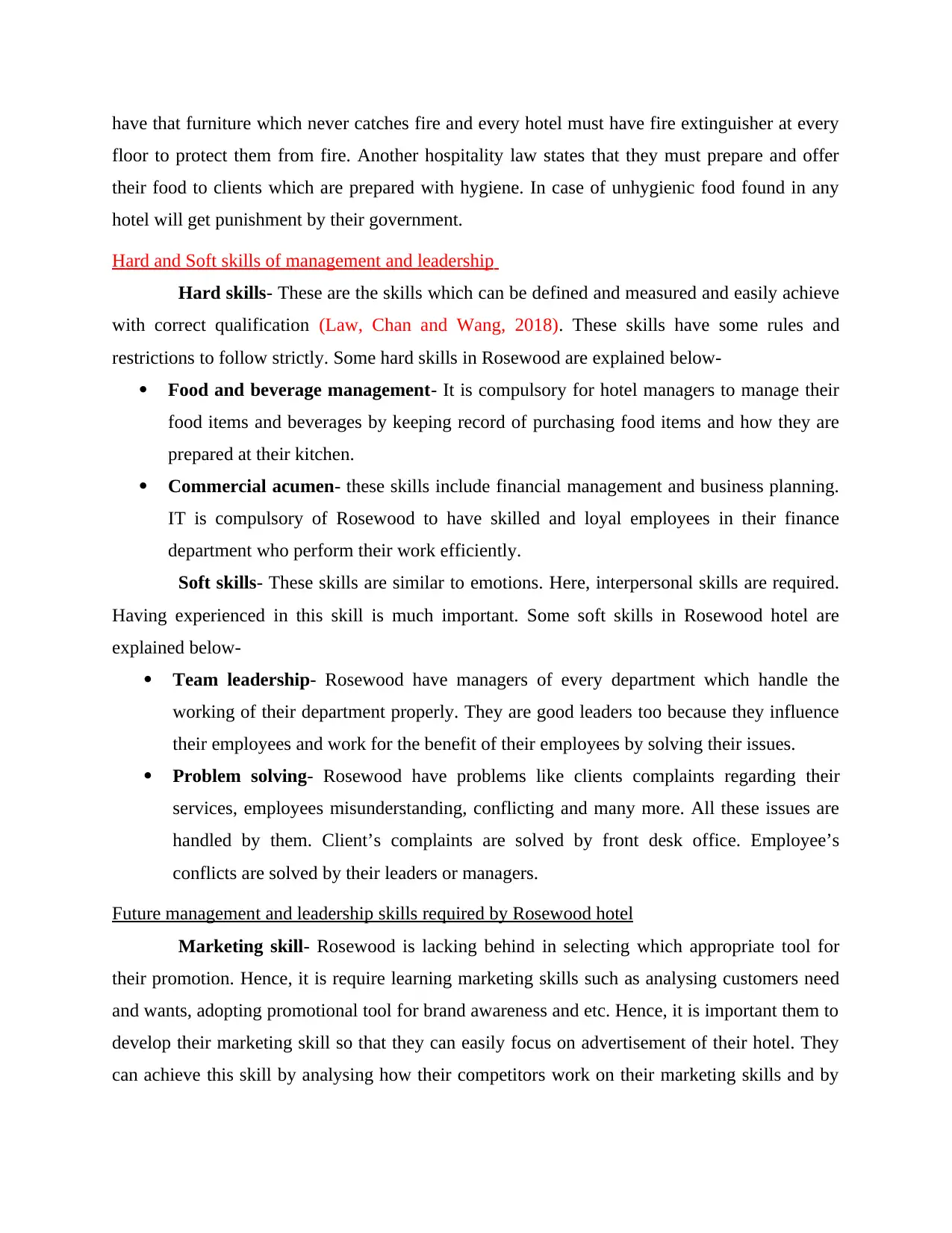
have that furniture which never catches fire and every hotel must have fire extinguisher at every
floor to protect them from fire. Another hospitality law states that they must prepare and offer
their food to clients which are prepared with hygiene. In case of unhygienic food found in any
hotel will get punishment by their government.
Hard and Soft skills of management and leadership
Hard skills- These are the skills which can be defined and measured and easily achieve
with correct qualification (Law, Chan and Wang, 2018). These skills have some rules and
restrictions to follow strictly. Some hard skills in Rosewood are explained below-
Food and beverage management- It is compulsory for hotel managers to manage their
food items and beverages by keeping record of purchasing food items and how they are
prepared at their kitchen.
Commercial acumen- these skills include financial management and business planning.
IT is compulsory of Rosewood to have skilled and loyal employees in their finance
department who perform their work efficiently.
Soft skills- These skills are similar to emotions. Here, interpersonal skills are required.
Having experienced in this skill is much important. Some soft skills in Rosewood hotel are
explained below-
Team leadership- Rosewood have managers of every department which handle the
working of their department properly. They are good leaders too because they influence
their employees and work for the benefit of their employees by solving their issues.
Problem solving- Rosewood have problems like clients complaints regarding their
services, employees misunderstanding, conflicting and many more. All these issues are
handled by them. Client’s complaints are solved by front desk office. Employee’s
conflicts are solved by their leaders or managers.
Future management and leadership skills required by Rosewood hotel
Marketing skill- Rosewood is lacking behind in selecting which appropriate tool for
their promotion. Hence, it is require learning marketing skills such as analysing customers need
and wants, adopting promotional tool for brand awareness and etc. Hence, it is important them to
develop their marketing skill so that they can easily focus on advertisement of their hotel. They
can achieve this skill by analysing how their competitors work on their marketing skills and by
floor to protect them from fire. Another hospitality law states that they must prepare and offer
their food to clients which are prepared with hygiene. In case of unhygienic food found in any
hotel will get punishment by their government.
Hard and Soft skills of management and leadership
Hard skills- These are the skills which can be defined and measured and easily achieve
with correct qualification (Law, Chan and Wang, 2018). These skills have some rules and
restrictions to follow strictly. Some hard skills in Rosewood are explained below-
Food and beverage management- It is compulsory for hotel managers to manage their
food items and beverages by keeping record of purchasing food items and how they are
prepared at their kitchen.
Commercial acumen- these skills include financial management and business planning.
IT is compulsory of Rosewood to have skilled and loyal employees in their finance
department who perform their work efficiently.
Soft skills- These skills are similar to emotions. Here, interpersonal skills are required.
Having experienced in this skill is much important. Some soft skills in Rosewood hotel are
explained below-
Team leadership- Rosewood have managers of every department which handle the
working of their department properly. They are good leaders too because they influence
their employees and work for the benefit of their employees by solving their issues.
Problem solving- Rosewood have problems like clients complaints regarding their
services, employees misunderstanding, conflicting and many more. All these issues are
handled by them. Client’s complaints are solved by front desk office. Employee’s
conflicts are solved by their leaders or managers.
Future management and leadership skills required by Rosewood hotel
Marketing skill- Rosewood is lacking behind in selecting which appropriate tool for
their promotion. Hence, it is require learning marketing skills such as analysing customers need
and wants, adopting promotional tool for brand awareness and etc. Hence, it is important them to
develop their marketing skill so that they can easily focus on advertisement of their hotel. They
can achieve this skill by analysing how their competitors work on their marketing skills and by
⊘ This is a preview!⊘
Do you want full access?
Subscribe today to unlock all pages.

Trusted by 1+ million students worldwide
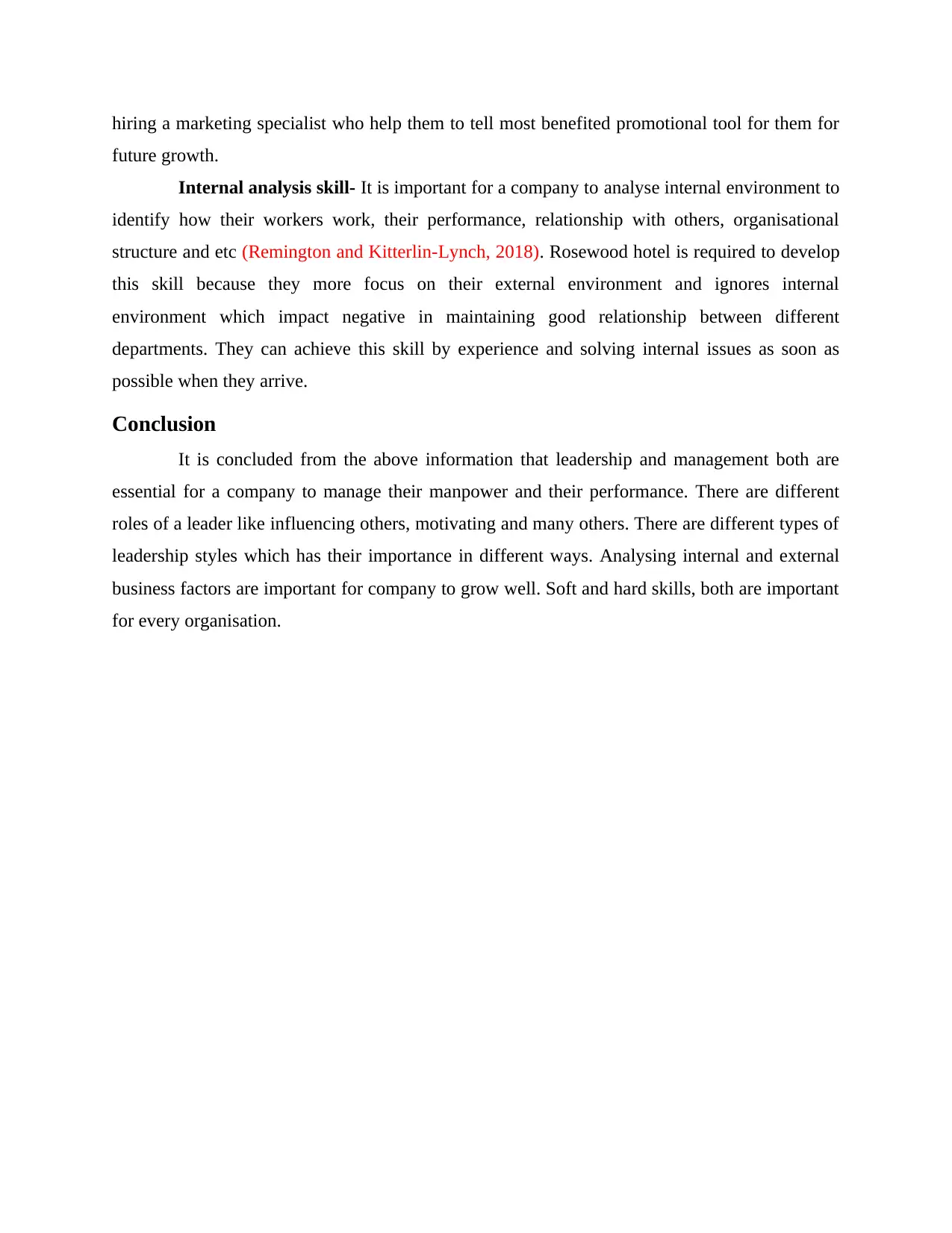
hiring a marketing specialist who help them to tell most benefited promotional tool for them for
future growth.
Internal analysis skill- It is important for a company to analyse internal environment to
identify how their workers work, their performance, relationship with others, organisational
structure and etc (Remington and Kitterlin-Lynch, 2018). Rosewood hotel is required to develop
this skill because they more focus on their external environment and ignores internal
environment which impact negative in maintaining good relationship between different
departments. They can achieve this skill by experience and solving internal issues as soon as
possible when they arrive.
Conclusion
It is concluded from the above information that leadership and management both are
essential for a company to manage their manpower and their performance. There are different
roles of a leader like influencing others, motivating and many others. There are different types of
leadership styles which has their importance in different ways. Analysing internal and external
business factors are important for company to grow well. Soft and hard skills, both are important
for every organisation.
future growth.
Internal analysis skill- It is important for a company to analyse internal environment to
identify how their workers work, their performance, relationship with others, organisational
structure and etc (Remington and Kitterlin-Lynch, 2018). Rosewood hotel is required to develop
this skill because they more focus on their external environment and ignores internal
environment which impact negative in maintaining good relationship between different
departments. They can achieve this skill by experience and solving internal issues as soon as
possible when they arrive.
Conclusion
It is concluded from the above information that leadership and management both are
essential for a company to manage their manpower and their performance. There are different
roles of a leader like influencing others, motivating and many others. There are different types of
leadership styles which has their importance in different ways. Analysing internal and external
business factors are important for company to grow well. Soft and hard skills, both are important
for every organisation.
Paraphrase This Document
Need a fresh take? Get an instant paraphrase of this document with our AI Paraphraser
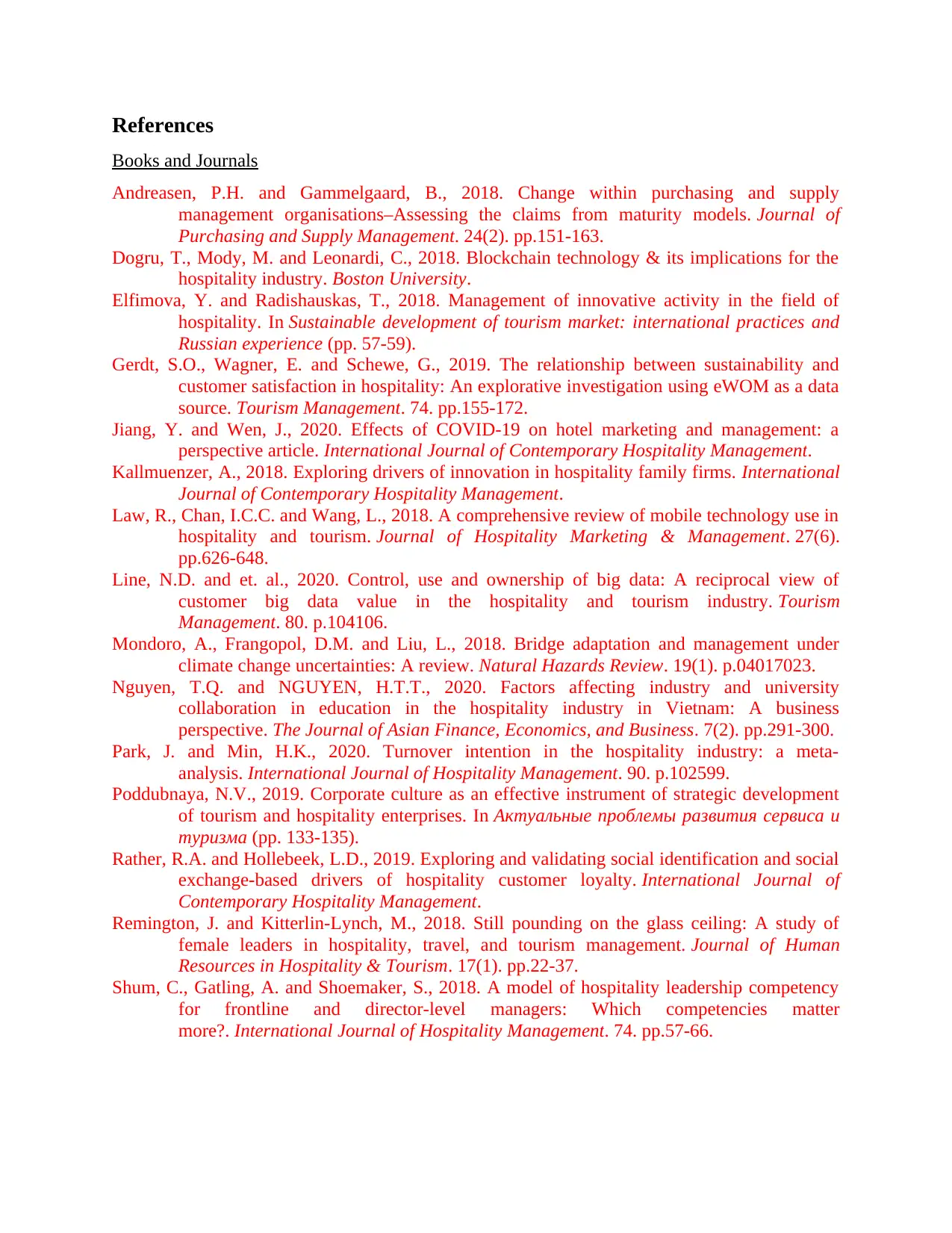
References
Books and Journals
Andreasen, P.H. and Gammelgaard, B., 2018. Change within purchasing and supply
management organisations–Assessing the claims from maturity models. Journal of
Purchasing and Supply Management. 24(2). pp.151-163.
Dogru, T., Mody, M. and Leonardi, C., 2018. Blockchain technology & its implications for the
hospitality industry. Boston University.
Elfimova, Y. and Radishauskas, T., 2018. Management of innovative activity in the field of
hospitality. In Sustainable development of tourism market: international practices and
Russian experience (pp. 57-59).
Gerdt, S.O., Wagner, E. and Schewe, G., 2019. The relationship between sustainability and
customer satisfaction in hospitality: An explorative investigation using eWOM as a data
source. Tourism Management. 74. pp.155-172.
Jiang, Y. and Wen, J., 2020. Effects of COVID-19 on hotel marketing and management: a
perspective article. International Journal of Contemporary Hospitality Management.
Kallmuenzer, A., 2018. Exploring drivers of innovation in hospitality family firms. International
Journal of Contemporary Hospitality Management.
Law, R., Chan, I.C.C. and Wang, L., 2018. A comprehensive review of mobile technology use in
hospitality and tourism. Journal of Hospitality Marketing & Management. 27(6).
pp.626-648.
Line, N.D. and et. al., 2020. Control, use and ownership of big data: A reciprocal view of
customer big data value in the hospitality and tourism industry. Tourism
Management. 80. p.104106.
Mondoro, A., Frangopol, D.M. and Liu, L., 2018. Bridge adaptation and management under
climate change uncertainties: A review. Natural Hazards Review. 19(1). p.04017023.
Nguyen, T.Q. and NGUYEN, H.T.T., 2020. Factors affecting industry and university
collaboration in education in the hospitality industry in Vietnam: A business
perspective. The Journal of Asian Finance, Economics, and Business. 7(2). pp.291-300.
Park, J. and Min, H.K., 2020. Turnover intention in the hospitality industry: a meta-
analysis. International Journal of Hospitality Management. 90. p.102599.
Poddubnaya, N.V., 2019. Corporate culture as an effective instrument of strategic development
of tourism and hospitality enterprises. In Актуальные проблемы развития сервиса и
туризма (pp. 133-135).
Rather, R.A. and Hollebeek, L.D., 2019. Exploring and validating social identification and social
exchange-based drivers of hospitality customer loyalty. International Journal of
Contemporary Hospitality Management.
Remington, J. and Kitterlin-Lynch, M., 2018. Still pounding on the glass ceiling: A study of
female leaders in hospitality, travel, and tourism management. Journal of Human
Resources in Hospitality & Tourism. 17(1). pp.22-37.
Shum, C., Gatling, A. and Shoemaker, S., 2018. A model of hospitality leadership competency
for frontline and director-level managers: Which competencies matter
more?. International Journal of Hospitality Management. 74. pp.57-66.
Books and Journals
Andreasen, P.H. and Gammelgaard, B., 2018. Change within purchasing and supply
management organisations–Assessing the claims from maturity models. Journal of
Purchasing and Supply Management. 24(2). pp.151-163.
Dogru, T., Mody, M. and Leonardi, C., 2018. Blockchain technology & its implications for the
hospitality industry. Boston University.
Elfimova, Y. and Radishauskas, T., 2018. Management of innovative activity in the field of
hospitality. In Sustainable development of tourism market: international practices and
Russian experience (pp. 57-59).
Gerdt, S.O., Wagner, E. and Schewe, G., 2019. The relationship between sustainability and
customer satisfaction in hospitality: An explorative investigation using eWOM as a data
source. Tourism Management. 74. pp.155-172.
Jiang, Y. and Wen, J., 2020. Effects of COVID-19 on hotel marketing and management: a
perspective article. International Journal of Contemporary Hospitality Management.
Kallmuenzer, A., 2018. Exploring drivers of innovation in hospitality family firms. International
Journal of Contemporary Hospitality Management.
Law, R., Chan, I.C.C. and Wang, L., 2018. A comprehensive review of mobile technology use in
hospitality and tourism. Journal of Hospitality Marketing & Management. 27(6).
pp.626-648.
Line, N.D. and et. al., 2020. Control, use and ownership of big data: A reciprocal view of
customer big data value in the hospitality and tourism industry. Tourism
Management. 80. p.104106.
Mondoro, A., Frangopol, D.M. and Liu, L., 2018. Bridge adaptation and management under
climate change uncertainties: A review. Natural Hazards Review. 19(1). p.04017023.
Nguyen, T.Q. and NGUYEN, H.T.T., 2020. Factors affecting industry and university
collaboration in education in the hospitality industry in Vietnam: A business
perspective. The Journal of Asian Finance, Economics, and Business. 7(2). pp.291-300.
Park, J. and Min, H.K., 2020. Turnover intention in the hospitality industry: a meta-
analysis. International Journal of Hospitality Management. 90. p.102599.
Poddubnaya, N.V., 2019. Corporate culture as an effective instrument of strategic development
of tourism and hospitality enterprises. In Актуальные проблемы развития сервиса и
туризма (pp. 133-135).
Rather, R.A. and Hollebeek, L.D., 2019. Exploring and validating social identification and social
exchange-based drivers of hospitality customer loyalty. International Journal of
Contemporary Hospitality Management.
Remington, J. and Kitterlin-Lynch, M., 2018. Still pounding on the glass ceiling: A study of
female leaders in hospitality, travel, and tourism management. Journal of Human
Resources in Hospitality & Tourism. 17(1). pp.22-37.
Shum, C., Gatling, A. and Shoemaker, S., 2018. A model of hospitality leadership competency
for frontline and director-level managers: Which competencies matter
more?. International Journal of Hospitality Management. 74. pp.57-66.
1 out of 11
Related Documents
Your All-in-One AI-Powered Toolkit for Academic Success.
+13062052269
info@desklib.com
Available 24*7 on WhatsApp / Email
![[object Object]](/_next/static/media/star-bottom.7253800d.svg)
Unlock your academic potential
Copyright © 2020–2026 A2Z Services. All Rights Reserved. Developed and managed by ZUCOL.





